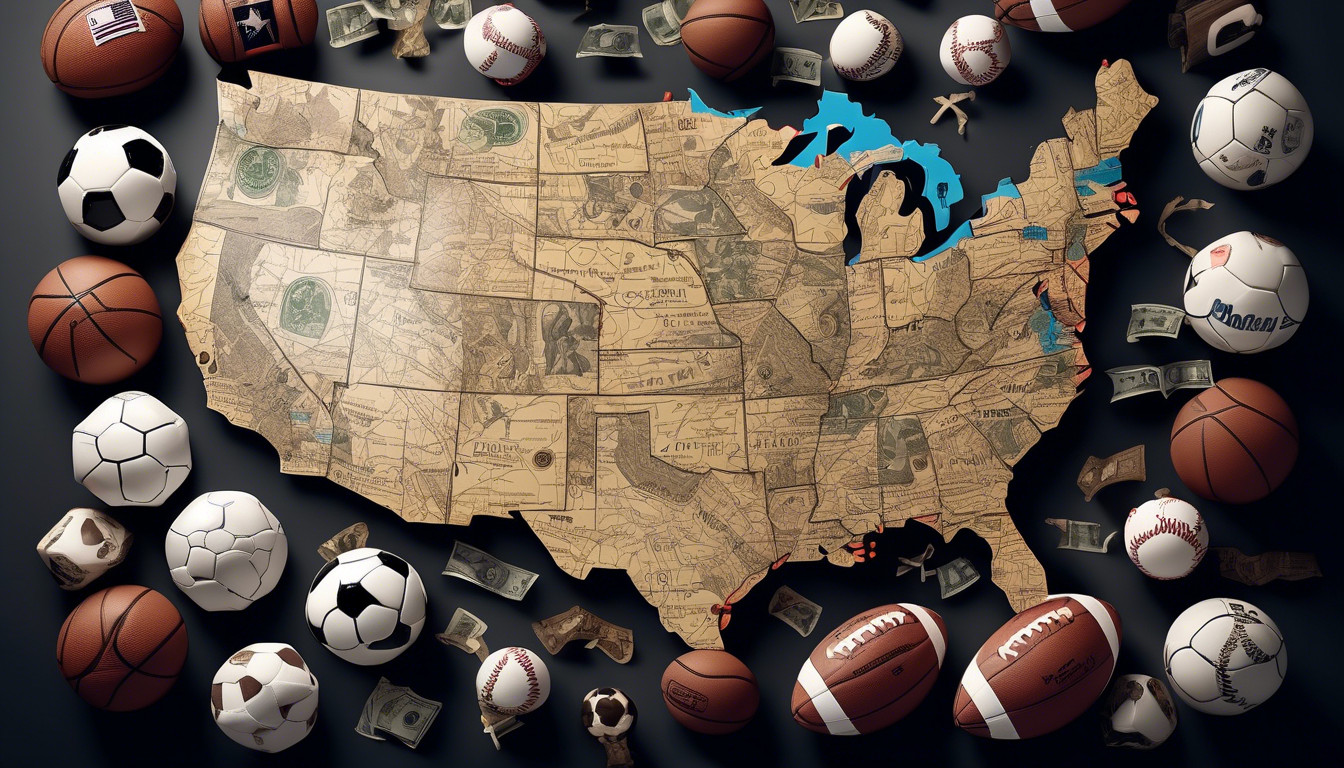The Evolving Landscape of Sports Betting in the U.S.
As we delve into the evolving landscape of sports betting across the United States, we find ourselves at a fascinating crossroads. Sweeping changes in legislation have allowed many states to embrace the thrill of sports wagering. However, amidst this wave of legalization, a handful of states have chosen to stand apart.
States Resistant to Sports Betting
Our curiosity piques as we explore which states have yet to join the sports betting frenzy and understand the reasons behind their decisions. In this article, we will navigate through the complexities and nuances of these states’ choices, examining the:
- Cultural factors
- Political factors
- Economic factors
Cultural, Political, and Economic Considerations
By examining these elements, we hope to shed light on the diverse perspectives within our nation and the potential future shifts that may eventually bring about change.
Potential Future Shifts
The potential future shifts may include:
- Changes in public opinion
- Economic pressures
- Political advocacy
Conclusion
Together, let’s embark on this journey to uncover the states that continue to resist the allure of sports betting. Understanding these factors can provide insights into the broader national debate on sports betting and its implications.
Nevada’s Unique Status
Nevada holds a unique position as the only state where sports betting was legal before the federal ban was lifted. This pioneering status has fostered a culture deeply embedded in sports wagering, creating a sense of belonging among enthusiasts who seek the thrill of placing bets.
Our thriving industry contrasts sharply with neighboring states like Utah and Texas, where legal sports betting has yet to be embraced.
In Nevada, we’ve built an identity around the freedom to wager, which has several key impacts:
- Attracting visitors from states like Texas, where betting opportunities are limited.
- Offering bustling casinos and sportsbooks that provide an experience akin to a second home for many visitors.
- Fostering a sense of community through shared excitement and camaraderie.
While Utah remains steadfast in its conservative approach, and Texas navigates its path, Nevada continues to lead the charge. We create connections and memories with every wager placed, upholding a unique legacy we are proud of.
Utah: A Conservative Stance
In our exploration of states without sports betting, Utah holds firmly to its conservative values, maintaining a strict prohibition on gambling activities. This stance sets Utah apart from neighboring Nevada, where Las Vegas thrives as a global gambling hub.
For us in Utah, the decision isn’t just about policy—it’s about community identity and shared values that prioritize family and religious principles over potential economic gain.
As residents of Utah, we understand that our collective beliefs shape the laws that govern us. While states like Texas are exploring sports betting options, Utah stands resolute, driven by a commitment to preserving a way of life deeply rooted in conservative traditions. Our community finds strength in this unity, embracing the notion that some things, like our values, are not for sale.
Together, we recognize that our unique identity doesn’t need to mimic Nevada’s gaming culture to thrive. Instead, we cherish the bonds that keep us connected and committed to our principles.
Hawaii’s Cultural Considerations
Hawaii’s Unique Cultural Approach to Sports Betting
Unlike many states, Hawaii’s unique cultural heritage influences its cautious approach to sports betting. We value our close-knit communities and prioritize traditions that keep us connected. This perspective makes Hawaii different from places like Nevada, where gambling is a major industry, or Texas, which is exploring sports betting opportunities.
While Utah shares our apprehension towards gambling, our reasons are deeply rooted in preserving our way of life rather than solely religious beliefs.
Reasons for Resistance
Hawaii’s resistance to sports betting isn’t just about maintaining cultural identity; it’s also about protecting our islands from potential social issues tied to gambling. We cherish the sense of unity and harmony that comes with our shared values and lifestyle.
- Unlike Texas, where sports are a significant part of the culture and economy, we focus on preserving the natural beauty and spirit of aloha that define us.
This collective mindset strengthens our resolve to keep sports betting at bay, fostering a sense of belonging and shared purpose.
Alaska’s Remote Position
Alaska’s remote location and sparse population play a significant role in its cautious approach to sports betting legalization. Unlike the bustling activity in Nevada, where casinos dominate the landscape, Alaska’s vast wilderness and tight-knit communities create a different dynamic. There is a strong sense of preserving what makes our state special and valuing our unique lifestyle.
In comparison:
- Utah’s strict stance on gambling reflects its cultural values.
- Texas, despite its size, also approaches sports betting with caution.
These states, like Alaska, weigh cultural and social factors heavily in their decision-making processes.
However, in Alaska, the challenges are compounded by logistical issues due to our remote position.
We understand the potential revenue benefits, as seen in states like Nevada, but we’re not quick to jump on the bandwagon. Our way of life is deeply connected to the environment and community, so any decision on sports betting would require careful consideration of its impact on our cherished lifestyle.
Wyoming: The Wild West
Wyoming’s Approach to Sports Betting
Wyoming, with its vast landscapes and frontier spirit, embraces a more open attitude toward sports betting compared to other states.
Comparison with Other States
- Unlike Utah, where gambling of any sort remains strictly prohibited, Wyoming has chosen a path more akin to its western neighbor, Nevada, known for its vibrant betting culture.
- In contrast to states like Texas, where the legal landscape remains murky, Wyoming offers clear opportunities for sports betting, fostering a sense of community and inclusivity.
Community and Shared Experience
In Wyoming, residents and visitors alike can partake in sports betting, creating a shared experience that’s both thrilling and inclusive. This openness allows for:
- A sense of community among those who share a love for sports and friendly wagers.
- Common ground through shared enthusiasm, casting aside the restrictions seen elsewhere.
Unique Sense of Belonging
While Wyoming may not have the bustling casinos of Nevada, its unique approach to sports betting offers a sense of belonging and freedom that sets it apart. Here, in the shadow of the Rockies, the state finds a harmonious balance between its natural beauty and the excitement of sports betting.
Wisconsin’s Legal Hurdles
Wisconsin faces significant legal challenges in establishing a framework for sports betting, unlike the more straightforward paths taken by states like Wyoming. The state must navigate a complex legal landscape that echoes the challenges seen in states like Utah and Texas. Unlike Nevada, where sports betting thrives, Wisconsin’s journey is riddled with constitutional constraints and a need for legislative approval.
In our community, there is a strong desire to embrace sports betting due to the camaraderie and economic benefits it promises. However, the existing compacts with Native American tribes complicate our path forward. These agreements grant exclusive gaming rights, making any expansion into sports betting a delicate negotiation.
To successfully establish sports betting in Wisconsin, we must:
- Address tribal negotiations to ensure that any changes respect existing agreements.
- Overcome legislative hurdles by working within the state’s legal framework.
While we look to successful models in Nevada for inspiration, we share a common goal: fostering a sense of belonging in the evolving sports betting landscape, while respecting the intricate legal framework that defines our state.
Idaho’s Regulatory Resistance
Idaho’s Reluctance to Embrace Sports Betting
Idaho’s hesitation to adopt sports betting is rooted in two main factors:
-
Regulatory Challenges: Navigating the complex web of regulations required to legalize sports betting presents significant challenges.
-
Conservative Political Climate: A strong preference for traditional values influences the state’s decision-making, leading to a cautious approach.
Comparison with Neighboring States
- Like Idaho, Utah also resists the temptation of legal sports wagering, preferring to maintain traditional values.
- Conversely, Nevada embraces a thriving betting industry, highlighting the contrasting approaches between neighboring states.
Preservation of Identity
Idahoans take pride in:
- Firm Beliefs: The state’s identity is closely tied to maintaining its established values.
- Traditional Entertainment: Sports betting is seen as a potential threat to the state’s cultural landscape.
Community Cohesion
Idaho’s community cohesion stems from:
- Shared values prioritizing traditional approaches.
- A collective understanding that rapid changes, such as introducing sports betting, might disrupt the way of life.
A Selective Stance
By resisting sports betting, Idaho aligns with states like Utah, choosing to cherish the familiar and uphold traditional values over exploring the unknown.
Texas: Big State, No Bet
In the vast expanse of Texas, sports betting remains off-limits due to a combination of political opposition and deeply rooted cultural perspectives.
Unlike Nevada, where betting thrives, Texas holds tightly to its values, reflecting a unique blend of tradition and modernity. We Texans pride ourselves on our distinct identity, often comparing ourselves to our neighbors. While Utah also stands firm against sports wagering, citing similar cultural and religious reasons, Texas’s stance is more about preserving a way of life that values tradition and community above outside influence.
As we gather at local football games or enjoy a basketball night, the thrill comes from the camaraderie, not the odds. We don’t need the glitz of Nevada’s betting scene to feel connected to our teams and each other.
Instead, our gatherings are about:
- Shared experiences
- A love for the game
In Texas, we embrace our heritage, where the focus is on unity and spirited support, not gambling.
Conclusion
In conclusion, several states, such as Utah, Hawaii, Alaska, Wyoming, Wisconsin, Idaho, and Texas, currently do not have legalized sports betting.
Each state has its unique reasons for not embracing this form of gambling, ranging from cultural considerations to legal hurdles.
Despite the growing popularity of sports betting across the country, these states have chosen to remain on the sidelines, maintaining their stance against this particular form of entertainment.

